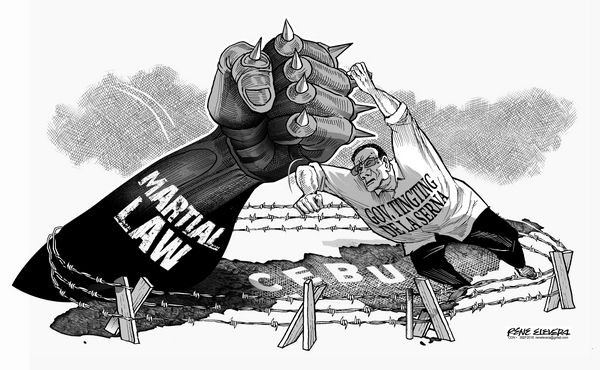
Vicente “Tingting” de la Serna, former governor of Cebu province died of lung cancer past midnight, the first of September. He was 66.
To many who stood with him in the parliament of the streets in the dark days of martial law of which the beginning is being commemorated on his death month, De la Serna was a man of the masses.
After the Edsa People Power Revolution of 1986 that toppled the strongman Ferdinand Marcos, then President Corazon Aquino put De la Serna in charge of the Office of the Mayor in Mandaue City.
He went on to become governor of Cebu, succeeding Emilio Osmeña in 1992 though he failed to secure a second term in 1995.
Through De la Serna’s leadership, the city and province of Cebu eventually entered into an agreement to allow the urban poor to settle in province-owned lots in the city.
He was a simple man, Barcenas recalled. He would go to work at the Capitol and back home on his own motorbike.
Meinrado Paredes, retired judge, paid tribute to De la Serna for his honesty.
Agnes Magpale, Cebu vice governor and De la Serna’s cousin acknowledged De la Serna for having taught her many things when she first ran for a Provincial Board seat.
According to his daughter, Dr. Frances, De la Serna’s passing and wake would have been a private affair if not for the desire of his friends and supporters for whom there was a public viewing.
De la Serna himself had requested for a quiet interment within 24 hours of his expiry. Notable is this modesty, a reverberation of the relative silence to which he withdrew by the time he realized the absence of a mandate for him to serve in elective office.
By comparison, the elaborately or orchestrated political rehabilitation of the family of Marcos, whose regime De la Serna and other stalwarts such as Nenita Cortez Daluz, Democrito Barcenas, and Hilario Davide Jr. helped thwart flags a severe inability to let go of power.
To the surreptitious hero’s burial for the dictator’s remains, an event with a legality wrested by Marcos loyalists with the help of a High Court majority that participated in historical revisionism by denying Marcos’ dishonorable dismissal via People Power, De la Serna’s will to modesty in funeral arrangements is a stern rebuke.
As the Marcoses go up and down the country exhorting Filipinos to forget their atrocities, may the people never forget the virtues of De la Serna like honesty and simplicity. From virtues like this, there is no moving on.
De la Serna is gone. Others who fought authoritarianism will also go in due time. But as long as people remember what he stood for, truth will always hound, catch up with, and uncover lies, no matter how powerfully propped up or glamorously dressed up they are by those who wish to hoodwink Filipinos again.